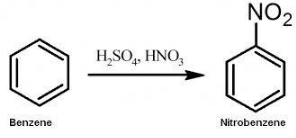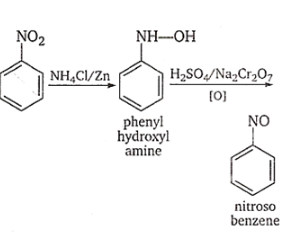Question
Question: Hydrazobenzene can be obtained from nitro benzene in the presence of: (A) \[Zn + KOH\] (B) \[Zn...
Hydrazobenzene can be obtained from nitro benzene in the presence of:
(A) Zn+KOH
(B) Zn+HCl
(C) Zn+ZnO
(D) Zn+H2SO4
Solution
For solving this problem we should know the reactions of nitrobenzene. Nitrobenzene is acidic in nature so we have to study the properties of them as well. And we need to know all the possible ways to prepare hydrazobenzene. Then only we can be able to solve the above problem. And also consider the given reagents and their reaction with nitrobenzene to answer the question correctly.
Complete step-by-step answer: Nitrobenzene is an organic compound having the chemical formula C6H5NO2. It is a water insoluble compound with almond like odour and a pale yellow outlook. Nitrobenzene is obtained from nitration of benzene. Nitration reaction occurs in presence of benzene and mixed acid (H2SO4,H2OandHNO3).

Hydrazobenzene is a derivative of hydrazine. It is a colorless crystal at room temperature. It is practically insoluble in water, slightly soluble in benzene, completely soluble in ethanol.
It is also called 1,2−diphenylhydrazine. It is an important chemical for industrial uses and also used widely in preparation of hydrogen peroxide.
If we talk about the reaction of nitrobenzene with Zn+HCl:
Nitrobenzene will be reduced in presence of Zn+HCl and aniline will be produced.

If nitrobenzene is treated with Zndust and H2SO4it will produce nitrosobenzene.

And finally, if we treat nitrobenzene with Zndust and alcohol KOHwe will get hydrazobenzene as a product.
C6H5NO2+ZnPowder+alcoholicKOH→C6H5−NH−NH−C6H5
So, the answer will be option (A)
Note: considering all the reactions with nitrobenzene we will get the answer. ZnDust and KOHand also sodium amalgam and carbon will be required for the completion of the reaction. In sodium amalgam it is necessary to have 0.1−0.2%sodium.
